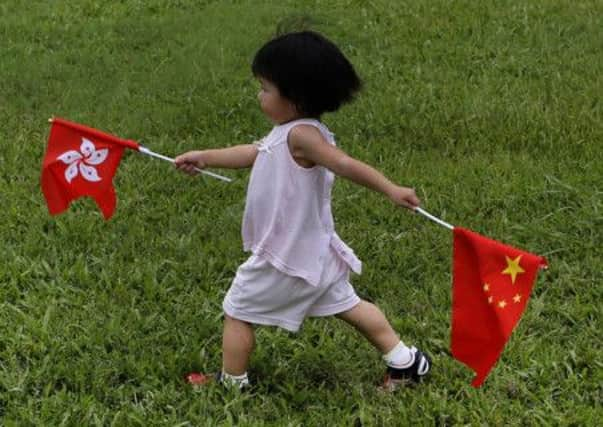Hong Kongers refuse to kowtow to Red Dragon


Then, in June, it came to life, flashing giant Chinese characters that some in Hong Kong saw as a warning. “People’s Liberation Army,” it said.
Many had already feared that Hong Kong’s future as an open society as well as a semi-autonomous part of China was in jeopardy in the face of perceived growing intervention from Beijing.
Advertisement
Hide AdAdvertisement
Hide AdThousands had turned out days earlier for a vigil to commemorate victims of the 1989 Tiananmen Square massacre, while an unprecedented policy “white paper” declaring Beijing’s irrevocable control over the territory had generated furious debate about its future.
Now with the Chinese military building’s brief debut in the city’s Symphony of Lights, it felt like nothing less than a show of force, 17 years after Britain handed the territory back to Chinese control.
People here have long prided themselves as providing a stable, sophisticated alternative to Communist China. But now, Hong Kongers say the soul of their society is under attack.
One significant fear is that Beijing is breaking promises to let voters elect their leaders for the first time starting in 2017.
Chief executive Leung Chun-ying, who was hand-picked by a committee of mostly pro-Beijing elites, recently asked China’s legislature for con- stitutional changes to allow the territory to pick its own leader. However, his report said “mainstream opinion” wanted the committee – instead of the electorate – to pick candidates, setting the stage for a confrontation with democracy groups.
Already, the pro-Beijing influence is threatening a disciplined civil service corps traditionally untainted by political corruption, says Anson Chan, who was Hong Kong’s chief secretary and No 2 official from 1993 to 2001.
In the eyes of Chan and others, Beijing’s influence has also hit the city’s media. Most newspapers no longer run stories critical of the Chinese government. Hong Kong’s journalists’ association called the past 12 months “the darkest for press freedom for several decades”.
The most troubling blow came last month with the white paper, which argued that Hong Kong’s high degree of autonomy, dubbed “one country, two systems,” was entirely at Beijing’s discretion.
Advertisement
Hide AdAdvertisement
Hide Ad“We are definitely at a crossroads,” Chan says. “Hong Kong people are growing increasingly angry and frustrated, and I think something has to give.”
Not everyone agrees. “Beijing is doing a good job in China. And the Communist government in Beijing is doing all the right things about Hong Kong that it’s supposed to be doing,” said Robert Chow, spokesman for Silent Majority, a group which opposes a plan by pro-democracy protesters to occupy the city’s financial centre.
Pro-government Hong Kong legislators also say critics are overdramatising the Chinese threat and they warn that protesters who plan to shut down the city are the real danger.
Some are already looking to move away. Yet last month, up to 800,000 Hong Kongers voted in an activist-sponsored online referendum on electoral reform, which Beijing called illegal.
“If we stay silent, the situation will only get worse,” said Joshua Wong, 17, who opposed attempts to introduce pro-Beijing education in schools.
For Roger Chen, who moved from the mainland a year ago, Hong Kongers are only feeling insecure in the face of China’s booming economy, which has eclipsed the territory’s importance as a commercial gateway to the mainland.
“Beijing has no intention to break their deal,” Chen said. “Hong Kong is more like a child of Beijing. It’s a very cherished child of China.”